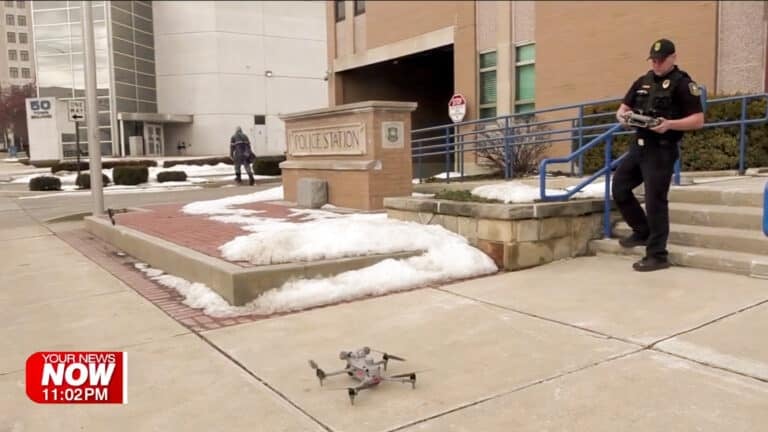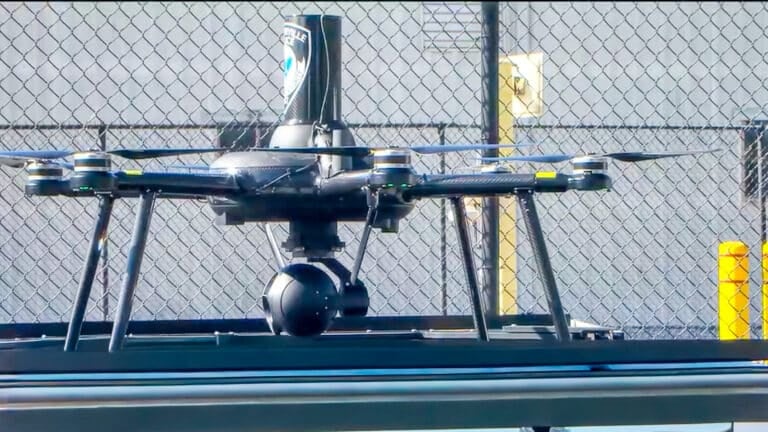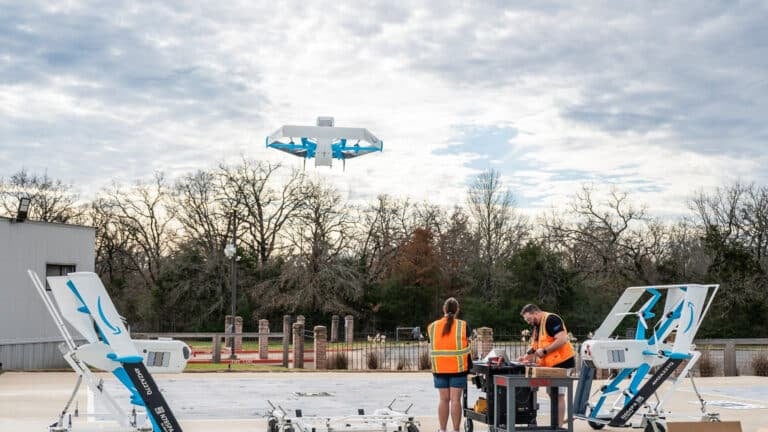UK’s Chinese EV Ban Mirrors America’s DJI Drone Crackdown. Western Security Theater Goes Global

Check out the Best Deals on Amazon for DJI Drones today!
The playbook American lawmakers perfected against DJI drones is crossing the Atlantic. The UK Ministry of Defence is considering a blanket ban on Chinese-manufactured electric vehicles for military personnel, citing surveillance concerns over built-in cameras and microphones—the exact same argument U.S. officials used to justify restrictions on Chinese drones despite years of failing to produce public evidence.
Defence Minister Luke Pollard confirmed British soldiers have been instructed to avoid classified conversations inside vehicles and that the Ministry is investigating security measures. The restrictions target any vehicle with Chinese components, from BYD and MG to Jaguar Land Rover, BMW, and Volkswagen models sourcing Chinese parts.
Sound familiar? Replace “electric vehicles” with “drones” and you get the campaign against DJI that dominated U.S. drone policy for nearly a decade.
America Wrote the Script: Years of DJI Accusations Without Evidence
The United States launched its crusade against DJI in 2017 when the U.S. Army issued a ban based on allegations that DJI drones were secretly configured to collect and send user data back to China. In November 2017, an internal Department of Homeland Security memo claimed DJI was using its drones to collect sensitive information in the U.S. and share it with the Chinese government.
DJI responded by releasing special Government Edition drones and Local Data Mode, allowing pilots to fly without any data being shared. The company hired independent cybersecurity firms to validate the feature. Multiple audits by Booz Allen Hamilton, FTI Consulting, the U.S. Department of Interior, and Idaho National Laboratory found no evidence of unauthorized data transmission.
The evidence kept not appearing, but the legislative pressure kept mounting.
In April 2023, Congresswoman Elise Stefanik declared that DJI drones posed “the national security threat of TikTok, but with wings.” She introduced the Countering CCP Drones Act to add DJI to the FCC’s Covered List, effectively banning the company’s products from U.S. communications infrastructure.
The U.S. House voted to ban new DJI drones in September 2024. DJI faces automatic addition to the FCC’s Covered List unless federal agencies completed mandated security assessments before December 23rd, 2025, assessments that will likely never materialize despite DJI sending formal requests to all five designated agencies.

The DJI Playbook: Restrict First, Find Evidence Later
As DroneXL documented in September 2025, the anti-DJI campaign has become so intense that a network of proxy companies emerged across the U.S.—using proprietary DJI technology while trying to avoide direct association with the Chinese manufacturer to circumvent restrictions.
The campaign’s real motivation became clear: American drone manufacturers couldn’t compete with DJI’s technology and pricing, so persuaded by lobbyists, lawmakers attempted to eliminate the competition through legislation rather than innovation. DJI controls over 90 percent of the consumer drone market and 88 percent of drones used by New York state and local agencies are manufactured by DJI or Autel Robotics.
DJI systematically addressed every security concern raised. Since June 2024, American users can’t sync data to DJI servers. The company’s drones can operate completely offline using Local Data Mode and erase data on command. A 2023 study by FTI Consulting found that DJI drones in local data mode didn’t transmit any information whatsoever.
Yet the drumbeat for a ban continued. The timing was conspicuous: American drone manufacturers can’t compete, so lawmakers are attempting to eliminate the competition through legislation rather than innovation.
UK Imports the Strategy: Chinese EVs Get the DJI Treatment
Now the UK is running the identical playbook against Chinese electric vehicles—and the timing is just as suspicious. Physical evidence emerged in November 2025 when warning stickers appeared on dashboards of hundreds of UK Ministry of Defence vehicles: “MOD devices are NOT to be connected to vehicle” and “Avoid conversations above OFFICIAL within vehicle.”
Personnel at RAF Wyton in Cambridgeshire—the UK’s premier military intelligence hub—received instructions to park EVs with Chinese components at least two miles away from key buildings. Similar restrictions apply at Salisbury Plain training area.
The restrictions coincide with Chinese automaker BYD’s explosive growth in the UK market. BYD registered almost seven times more new cars than Tesla in October 2025, with year-to-date sales soaring more than sixfold to 39,103 vehicles. The company sold just 8,788 vehicles in the entire UK market during 2024—now it dominates.
UK officials cite concerns that Chinese government laws could compel manufacturers to share data collected by vehicle sensors, cameras, and GPS systems. No concrete evidence of such data transmission has been made public—exactly like the DJI situation.
Defence Minister Luke Pollard told LBC that although Chinese-made cars represent a “very small number” of MoD vehicles, the precautions were “prudent and reasonable.” He added: “There’s Chinese technology everywhere. Because it is everywhere, we have to take more prudent steps across our entire economy.”
The Pattern: Technical Solutions Ignored, Blanket Bans Preferred
Both the U.S. campaign against DJI drones and the UK restrictions on Chinese EVs share a critical flaw: they ignore technical solutions that would address alleged vulnerabilities across all manufacturers.
As drone industry experts pointed out during the DJI ban debates, air-gapping prevents network connectivity entirely. Virtual private networks secure communications. Mobile device management systems can isolate drone networks from sensitive infrastructure.
DJ Smith, a technical surveillance agent with Virginia State Police, asked the obvious question during a 2024 AUVSI discussion:
“If we can take that system, air gap it from any kind of cyber issue by running it through a VPN, through Airship or any of the MDM companies… and it’s not touching a network, where else is there a threat matrix that we have to worry about?”
The same technical solutions apply to electric vehicles. Air-gapping prevents network connectivity. VPNs secure communications. Mobile device management can isolate vehicle systems. These measures would address alleged vulnerabilities—but they don’t eliminate market competition the way country-of-origin bans do.
Beyond Drones and Cars: A Broader Western Strategy
The coordinated approach extends beyond drones and electric vehicles. The United States discovered undocumented communication devices in Chinese solar inverters connected to the electrical grid in May 2025. Chinese EV privacy concerns emerged in October 2024 when an Australian BYD owner discovered the car’s internal SIM could be dialed externally.
The U.S. proposed sweeping bans on Chinese tech in cars in September 2024. By October 2024, the U.S. moved to ban Chinese EVs entirely, citing the same surveillance concerns British officials now echo.
Each case follows the same template: express concerns about Chinese technology based on theoretical vulnerabilities, propose blanket restrictions, avoid technical solutions that would address security issues across all manufacturers regardless of origin.
This represents a coordinated Western strategy spreading from the United States to allied nations. What America pioneered with DJI drones, the UK now applies to Chinese EVs. The Five Eyes intelligence alliance—which includes the U.S., UK, Canada, Australia, and New Zealand—appears to be adopting unified approaches to Chinese technology across multiple sectors.
The Cost of Security Theater: First Responders and Public Safety
The human cost of the DJI ban campaign became clear as it progressed. American first responders relied on DJI drones for search and rescue missions, firefighting, disaster response, and accident reconstruction. The alternatives were prohibitively expensive or technologically inferior.
Tim Rigdon, founder of CropCare agricultural drone company in western New York, told the Times Union he was considering closing entirely if Chinese drones were banned.
“The only way to get American companies to get better, because we’re so far behind, is to fly American drones, but it’s a huge upfront cost,” Rigdon said.
New York State Police spent $150,000 on new DJI drones in 2024 despite already owning about 100 units—because nothing else matched the capability-to-cost ratio. Asheville, North Carolina police used DJI drones during Hurricane Helene for rescues, damage mapping, and real-time situational awareness.
Deputy Chief Brian Kohlhepp of Ross Township, Pennsylvania defended continued DJI use: “We don’t use [DJI drones] in any capacity where anything that we’re reviewing isn’t publicly available on Google Maps. I would argue that the use of the drones wouldn’t reveal anything that compromises national security.”
Now British military personnel face similar constraints with electric vehicles. The MoD already leases hundreds of EVs including Chinese-made models. Blanket bans would create operational disruptions and force expensive fleet replacements—all to address threats that remain theoretical rather than demonstrated.
Market Dominance Triggers “Security Concerns”
The timing of both campaigns suggests economic protection masquerading as national security. DJI dominated the U.S. drone market with over 70% market share when restrictions intensified. American competitors like Skydio couldn’t match DJI’s combination of advanced features, reliability, and pricing.
BYD now dominates the UK EV market with explosive growth that reversed a 6-to-1 Tesla advantage in less than a year. The company plans to double its European dealer network to 2,000 locations by 2026 and establish multiple European factories.
BYD’s localization strategy makes country-of-origin bans increasingly meaningless—just as DJI’s proxy company network attempted to circumvent drone restrictions. BYD’s Hungary factory opens by end of 2025, followed by Turkey in 2026. Vehicles built in Europe with European components still carry Chinese engineering and software.
Conservative Shadow Security Minister Alicia Kearns told the i paper: “We need to see a full pivot away from Chinese produced EVs in the British military and government fleets.” The statement echoes American lawmakers’ calls to eliminate DJI from federal government use—demands that became law in the 2024 National Defense Authorization Act.
The Evidence That Never Materializes
The fundamental issue remains consistent across both campaigns: where’s the evidence?
If U.S. officials possessed compelling evidence that DJI drones transmitted sensitive data to Beijing, they had years to declassify and present it. They didn’t. If British officials have proof that Chinese vehicles actively spy on military personnel, they should make it public. They haven’t.
Democracies deserve transparency about threats justifying market restrictions. Secret evidence used to ban commercial products sets dangerous precedents—especially when the restrictions coincidentally benefit domestic industries struggling against foreign competition.
The DJI precedent established that evidence isn’t actually required. Theoretical vulnerabilities treated as confirmed threats, absence of declassified proof, and legislative action proceeding regardless of independent audits validating security measures.
Georgia Tech professor Annie Anton, who specializes in cybersecurity, supported DJI restrictions by comparing them to semiconductor policy: “Banning Chinese drones would eliminate competition with that nation but new incentives for American suppliers will help advance the U.S.” The statement revealed the underlying logic—eliminate competition first, develop domestic alternatives later.
What the Drone Industry Teaches About EV Restrictions
The drone industry’s experience with anti-Chinese technology campaigns offers clear lessons for what’s coming with electric vehicles:
Independent audits won’t matter. DJI underwent multiple security assessments by respected firms and government agencies. All validated the company’s security measures. Lawmakers proceeded with bans anyway.
Technical solutions will be ignored. Air-gapping, VPNs, mobile device management, and Local Data Mode addressed every specific vulnerability cited. Legislators preferred blanket bans to surgical fixes.
Market dominance triggers action. Restrictions intensified as DJI’s market share grew and American competitors failed to match Chinese capabilities and pricing. BYD’s UK success is following the same trajectory.
Proxy strategies emerge. The anti-DJI campaign spawned networks of companies selling DJI-designed technology under alternative brands. Chinese EV manufacturers will attempt similar approaches.
Public safety takes a backseat. First responders who relied on DJI drones faced operational disruptions without adequate replacements. British military and government users will experience similar constraints with EVs.
Evidence remains classified. Despite years of accusations and legislative action, no smoking gun proving Chinese espionage through DJI products ever emerged publicly. Expect the same pattern with EVs.

DroneXL’s Take: Western Security Theater Goes Global
The UK’s adoption of America’s anti-DJI playbook marks a troubling evolution in Western technology policy. What began as U.S. legislative campaigns against Chinese drones is becoming a coordinated Five Eyes strategy targeting Chinese technology across multiple sectors.
The pattern is unmistakable and deeply concerning for anyone who values evidence-based policy over protectionist theater. Theoretical vulnerabilities get treated as confirmed threats. Technical solutions that would address security concerns across all manufacturers get ignored in favor of country-of-origin bans. Market success by Chinese companies triggers “national security” responses that coincidentally benefit struggling Western competitors.
For the drone community, this feels like watching our nightmare exported to other industries. We spent years documenting how DJI systematically addressed every security concern, implemented Local Data Mode, commissioned independent audits, and removed data syncing capabilities for American users—only to watch lawmakers proceed with bans anyway.
Now electric vehicle users are entering the same maze. Chinese EVs will undergo security audits that validate their systems. Manufacturers will implement air-gapped operation modes and local data storage. Independent firms will find no evidence of unauthorized transmission. And restrictions will proceed regardless, because the goal was never security.
Legitimate security concerns about Chinese technology deserve serious attention. Chinese laws do require companies to cooperate with state intelligence requests. That creates real risks requiring mitigation. But treating entire categories of technology as inherently compromised based on manufacturing origin—while ignoring identical vulnerabilities in Western products—reveals motivations beyond pure security.
The smarter approach for both drones and vehicles involves defense-in-depth: technical security measures applicable to all connected devices regardless of manufacturer, transparent data practices with enforceable standards, regular security audits, and user controls over data transmission. These solutions address actual vulnerabilities without presuming guilt based on corporate headquarters location.
But that approach requires Western manufacturers to compete on innovation and price—something American drone makers failed to do against DJI, and something European automakers are failing to do against BYD. When domestic industries can’t compete on merit, governments reach for regulation disguised as national security.
The UK’s restrictions on Chinese EVs represent the globalization of America’s failed drone policy. Other Five Eyes nations will likely follow. Canada, Australia, and New Zealand may soon announce their own restrictions on Chinese technology—drones, vehicles, solar equipment, telecommunications infrastructure—following templates established in Washington and now adopted in London.
For drone pilots who lived through the DJI ban saga, this expansion of security theater to other industries feels inevitable and depressing. We watched technical excellence and market success get punished through legislative action unmoored from evidence. Now vehicle owners get the same treatment.
The cost won’t be measured just in market distortions and consumer choice limitations. It will be measured in first responders without adequate tools, military personnel facing operational constraints, and citizens denied access to technology that works because their governments prefer protection over competition.
The DJI precedent established that evidence isn’t required, independent audits don’t matter, and technical solutions will be ignored. The UK’s Chinese EV restrictions confirm that template is now standard Western policy toward Chinese technology.
Anyone using Chinese-manufactured products—whether drones, vehicles, solar panels, or telecommunications equipment—should expect similar treatment. The playbook has been written. The strategy is spreading. And the drone industry’s experience suggests it won’t matter how much evidence manufacturers provide to the contrary.
Discover more from DroneXL.co
Subscribe to get the latest posts sent to your email.
Check out our Classic Line of T-Shirts, Polos, Hoodies and more in our new store today!

MAKE YOUR VOICE HEARD
Proposed legislation threatens your ability to use drones for fun, work, and safety. The Drone Advocacy Alliance is fighting to ensure your voice is heard in these critical policy discussions.Join us and tell your elected officials to protect your right to fly.
Get your Part 107 Certificate
Pass the Part 107 test and take to the skies with the Pilot Institute. We have helped thousands of people become airplane and commercial drone pilots. Our courses are designed by industry experts to help you pass FAA tests and achieve your dreams.

Copyright © DroneXL.co 2026. All rights reserved. The content, images, and intellectual property on this website are protected by copyright law. Reproduction or distribution of any material without prior written permission from DroneXL.co is strictly prohibited. For permissions and inquiries, please contact us first. DroneXL.co is a proud partner of the Drone Advocacy Alliance. Be sure to check out DroneXL's sister site, EVXL.co, for all the latest news on electric vehicles.
FTC: DroneXL.co is an Amazon Associate and uses affiliate links that can generate income from qualifying purchases. We do not sell, share, rent out, or spam your email.


















